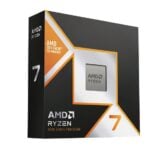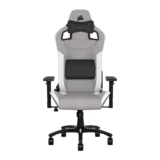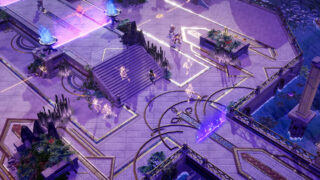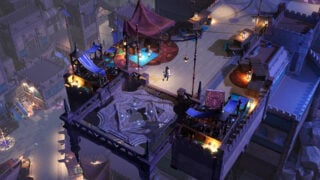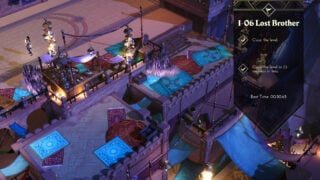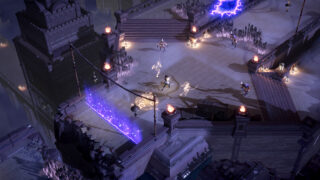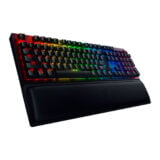Hands-on: Lysfanga’s fun time-shifting Hades-like gameplay takes inspiration from a surprising source
There’s a lot to like in this offering from Quantic Dream’s new indie label

Given that the Summer Game Fest period has seen more than 20 presentations and hundreds of new game reveals, it’s inevitable that some future gems may have flown under the radar somewhat.
A shining example of this is Lysfanga: The Time Shift Warrior – set for release later this year on PC, it’s one of the first games to be published by Quantic Dream’s new indie label, Spotlight.
The idea of Spotlight is that it gives smaller developers a chance to not only gain financial support from Quantic Dream, but also make use of its resources (such as its motion capture studio) and tap its collective brain for advice throughout development.
Shortly before Summer Game Fest kicked off, we visited Quantic Dream’s fancy new headquarters in Paris – one of the benefits of its acquisition by new owner NetEase – to see some of its upcoming Spotlight titles and go hands-on with a couple of them.
The first of these games to be released is Under the Waves, in which players control a grieving diver who tries to overcome loss while exploring the seabed in a small submarine. Given recent real-life events, then, it’s perhaps more sensible for now to focus our attention on its second game, Lysfanga, which is arguably the more curious of the two anyway.
The concept is a slightly difficult one to describe succinctly, but we’d say it’s what you’d get if you took Hades and added a mechanic not unlike multi-track music recording.
You play as Ime, a Lysfanga (protector of the realm) who has the unique ability to not only rewind time, but leave behind echo-like ‘clones’ of her actions when she does.
What this means in practice is that when you start each wave, you’re presented with a stage consisting of different routes and a variety of enemies. The aim is to kill every enemy, but you have a very short time limit which makes this impossible.
Instead, you fight until time runs out (or until you decide to end your run manually), and then time rewinds back to the start of the stage. This time, when you play, your previous run is there alongside you, repeating what you did.
In the most basic terms, this means you can start a stage, run off to the left, kill the enemies there, then rewind time. Then when you start the stage again your past ‘clone’ goes to the left and repeats your previous motions, leaving you free to run to the right and kill those enemies.
Naturally, as things progress stages get more complex and the enemies and obstacles that are encountered require new strategies to get past them.
Eventually you reach enemies that are linked to other enemies elsewhere on the map, which can only be killed if they’re both attacked simultaneously (meaning you have to kill one, then rewind and kill the other at the same time).
Then there are the giant shield-wielding brutes who always face you, but can only be harmed from behind. To defeat them, you have to deliberately hit them multiple times from the front and force them to use their shields, then rewind and use your second version to run behind them while they’re dealing with your first one.
The session we played offered a selection of stages designed to show how advanced things get later on, and by the time we reached the end we were faced with huge, multi-level maps with tens of enemies and loads of obstacles including bridges, door switches, bombs and the like.
As the complexity increases, so too does the number of times you can rewind, though this obviously brings its own challenges. It’s easy to keep track of things when you only have one or two ‘recordings’ to keep in mind, but when you’re eventually creating six or seven clones, all doing their own thing (hence the multitrack music analogy), it’s a real mental exercise to keep all their actions in the back of your mind.
“It’s easy to keep track of things when you only have one or two ‘recordings’ to keep in mind, but when you’re eventually creating six or seven clones, all doing their own thing, it’s a real mental exercise to keep all their actions in the back of your mind.”
By the end of our demo we were already sold on Lysfanga. Our heads may have been throbbing, but the idea of playing a co-op Hades-like where you control all of the protagonists one by one is executed brilliantly, and the addition of time trials – designed to make players optimise their run to find the best possible solution out of countless possible ones – just makes it all the more compelling.
We were curious to know where the inspiration for Lysfanga’s mechanics came from, so it was the first question we asked game director Thibault Legouet when we sat down for a chat with him after our demo. His response – time travel movies – wasn’t particularly surprising, but the specific film that had the most influence certainly was.
“The idea came from a single scene in a movie,” he told us. “I always like time travel movies – you know, Groundhog Day, Back to the Future, Edge of Tomorrow – because it’s a really interesting concept and you can never go right. There’s always something that goes wrong and the writer just goes ‘shut up, [it’s] magic, enjoy it’.
“You know, time travel never works. There’s always a problem and it’s always funny – how do you deal with your problems. One situation that always bothered me, though, is this – why, when you meet your past self, is it a big problem? Why can’t it just be magic and it works?
“And the one movie that did this well was the Futurama movie, Bender’s Big Score, where Bender goes back in time and steals a lot of artefacts and paintings, and just waits in the basement. And sometimes they open the basement and there’s hundreds of Benders just coming out with the things – and sure, why couldn’t you work with your past selves to do something?

“I had the idea that this could be very good in a video game, because you always have cooperation with other players or NPCs, but there’s always this element that they don’t always do what you want, you’re just like ‘what the fuck are you doing?’. And so if you fail, it’s not your fault.
“[with Lysfanga] you know the solution lies with you. There’s no external factor, it’s only you. If you fail, it’s because you didn’t crack the problem, and I wanted this to be the very basis of the game.
“I want the player to know they have all the tools, they just need to figure it out, which is why we don’t have typical hack-and-slash stables like skill trees or loot.”
That’s not to say the game doesn’t have some sort of customisation. In the demo we played, Ime had a special, chargeable move in which she could throw a fireball at enemies. But Legouet told us there are a number of other spells in the game which can be collected and applied in its place.
“For example, one spell we have is very basic, but you will see how big it changes [your tactics],” he explained. “When you cast it, you will begin your next loop wherever you are. So you cast it, you put a mark on the ground, and you will begin there next time [instead of at the stage’s normal start point].
“It’s very simple but now you can do a lot of new things. There are crystals that open doors, so you can now just begin next to a crystal and open the door right away on your next loop. These spells aren’t a one-time use, they’ll let you come up with elaborate strategies.
“A lot of our spells work this way, but we also have basic spells that just do damage, for players who don’t want that tool and just want a better way to deal with enemies.
“We think this diversity will help players try different things and find out what they like, because there’s no wrong answers – if it works, it works.”
With around 90 stages in total and an unlockable challenge mode where modifiers are added (for example, one challenge stage makes the door-opening crystals unbreakable, forcing the player to find another route), it’s clear Lysfanga’s flexibility in the way its stages can be tackled means no two players’ playthroughs will be the same.
We wondered aloud if the game was a QA nightmare because of this. “It’s definitely a lot of work,” Legouet confirmed. “We hope that we managed to make it work for all of the game, because it’s a really labour-intensive endeavour to make sure everything works and nothing breaks.
“And the game still breaks sometimes – you know, it’s not out yet, and that’s why – but we’re confident players will find a lot of ways to beat levels in whatever way they feel like they want to.”
“We think this diversity will help players try different things and find out what they like, because there’s no wrong answers – if it works, it works.”
As our chat with Legouet ended, we couldn’t resist pointing out that if Lysfanga becomes successful, no amount of QA in the world will prevent speedrunners eventually exploiting the game’s mechanics and coming up with bizarre, mind-bending ways to beat each stage in a fraction of the expected time.
“I love speedrunners and I love speedruns,” he replied. “I don’t have the patience or the motor skills to do it, I have old man hands. But for a student project with a game designer friend, we opened a speedrun page for our project and tried to get people to push it as far as they could.
“But it’s very interesting. Even if players completely break the game, it’s just funny. As long as it’s not everyone doing it by mistake, it’s alright. Like, we can fix it, but players have fun doing it, so why prevent them?”
You heard the man, speedrunners. Time to dust off your old copies of Futurama: Bender’s Big Score and brush up in advance of Lysfanga’s release later this year.

